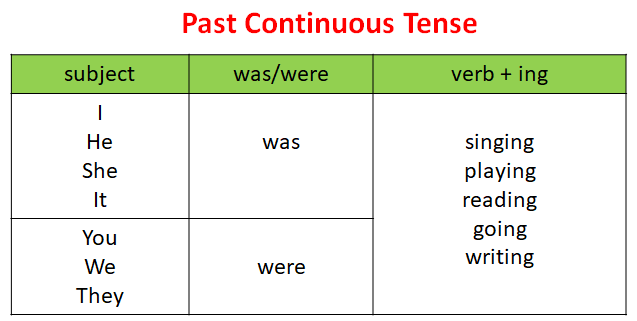In these lessons, we will learn
- Forms of Past Continuous Tense
- When we can use the Past Continuous Tense
- Negative Forms of Past Continuous Tense
The following table gives some examples of past continuous tense. Scroll down the page for more examples of when and how to use the past continuous tense.

Forms of Past Continuous Tense
was + present participle = past continuous
were + present participle = past continuous
Examples:
She was cleaning the room.
I was stacking the chairs.
They were waiting for the bus.
We were listening to the music.
Past Continuous Tense
The Past Continuous/Progressive Tense
The past continuous / progressive tense describes continuous events that happened in the past. We can form the past continuous/progressive tense with was/were + -ing.
Uses
- The past continuous/progressive tense is used to signify an action going on at some time in the past. The time of the action may or may not be indicated.
Examples:
We were listening to the radio all evening.
It was getting darker. - The past continuous tense/progressive tense is used when one action is interrupted by another action in the past. In such cases, the shorter action is expressed in simple past tense, and the longer action is expressed in the past continuous tense.
Examples:
I was reading when the doorbell rang.
When I saw him, John was playing chess. - The past continuous/progressive tense is used to signify persistent and usually annoying actions in the past. It is often used with words such as always, continually etc.
Examples:
He was always gambling.
Nick was always watching TV. - The past continuous/ progressive tense is used to give background information, or to give atmosphere to a story.
Example:
It was a beautiful day. The birds were singing, the sun was shining and in the cafes, people were laughing and chatting. - The past continuous/ progressive tense is used to signify two continuous actions that happened at the same time in the past:
Example:
I was watching TV and he was repairing the lawn mower.
Tense
Present Tense
Past
Tense
















No comments:
Post a Comment